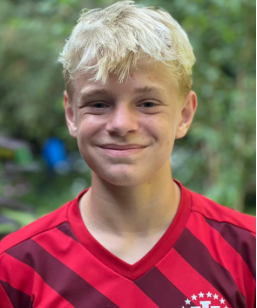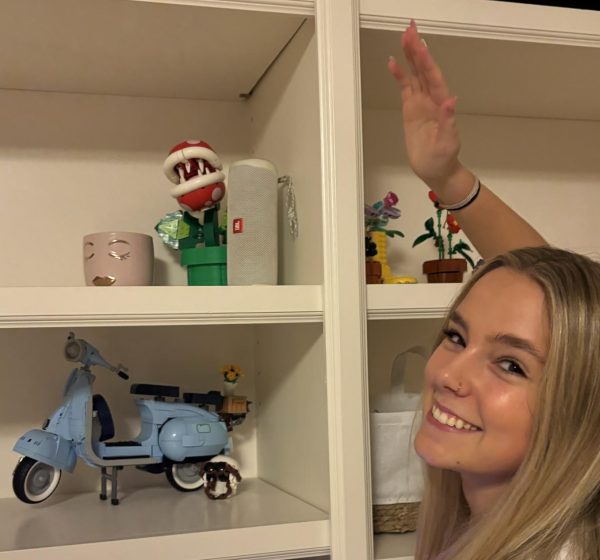“I hope that he’ll still know who I am” A family struggles with Parkinson’s

James McQuay has a lot of family support in his battle with Parkinson’s.
January 11, 2022
As we pull into the driveway, I can’t help but to think how much my grandpa’s Parkinson’s disease changed from the last time we visited.
Wondering if he is fully in a wheelchair now.
Wondering if he will still remember his grandson.
My mother’ fears are similar during the trip back to her childhood home, “I hope that he hasn’t regressed, and that he’ll know who I am and that you can still see a part of him and his personality still there,”.
Gazing at my grandparents’ house as we pull into the snowy driveway the memories flood back, the various holidays and days spread out throughout every year because of the ten-hour drive from Holland to Blaine, Minnesota.
We head into the house, opening the door into the new laundry room and wheelchair-friendly bathroom that had to be installed after my grandpa would no longer be able to use the bathroom and shower by himself.
I hear my grandma vacuuming upstairs; who always feels the need to spotlessly clean the house before company comes.
I pass by the old dining room that has been cleared out to make a bedroom for my grandpa because of his inability to travel up the stairs to reach his old bedroom of 45 years.
I see the small white alarms at the top of the main doors nearest to my grandpa’s new bedroom, newly put there because of when my grandpa left through these broad doors heading to the nearest gas station in the middle of the night to retrieve a bottle of Coca-Cola.
Eventually, he was found a couple of hours later by someone driving past, face down on the sidewalk, unable to get back up because of his lack of mobility.
Reaching the living room I see my grandpa in his reclining chair, newly replaced with an electric recliner that can rise so my grandma will be able to pull him up easier when he leaves his chair.
“Hi, Dad!” My mom says, as he looks over.
“Your voice sounds familiar,” my grandpa says, smiling.
My brother and I greet my grandpa, James McQuay, happy that he remembers us and that his bright personality still shines despite his condition.
But despite his cheerful atmosphere in the house I can’t help to notice both the walker and wheelchair in the room and now the complete inability to move around his house on his own.
Remembering his remark to me years ago during the first stages of Parkinson’s: that he was frustrated with his weakening strength, I wonder if his frustration has grown with his limited control over his own body needing to have help from others even to perform simple tasks.
A few hours later, after settling into where we would be staying over the holidays, I return downstairs already finding my mom trying out her activities with my grandpa to help him with his cognition skills.
“I want to ease the caretaker role for my mom, who does it full time while also engaging my dad in activities to keep him feeling helpful and to keep his mind active and busy so that he doesn’t continue to regress,” my mom said.
This caretaker role my mother refers to is now my Grandma’s full job, which I notice throughout our stay keeps her busy almost all the time.
I remember prematurely thinking a couple of years ago wondering how my grandmother was going to deal with all the downtime she would have with having to stay home with my grandpa.
But this is anything but the case.
“I feel busier now, or as busy as I ever have because grandpa takes a lot of time,” my grandma said.
Adding to this caretaker role my grandma has had to sacrifice her retirement for, is now that of a landlord and businesswoman.
Even during retirement, my grandpa continued the ownership of his eight-unit apartments that my family in Minnesota has had to take on.
My grandmother who had always played some role in helping my grandfather run this business has now become one of the main workers in running the apartments adding to the workload she finds herself with, in her 70s.
“I had to learn a lot of things that I didn’t know before which is a little stressful at times and adds to the busyness now,” my grandma said.
All these effects from my grandpa’s disease have found their impact on every single person in our family, adding more stress onto the already busy lives of the parents, workers, and children in the Mcquay family.
But even despite the hardships some things always stay the same in this strong family.
The simple things, eating dinner together at night, my mom telling my Grandma to stop cleaning and come sit down to eat.
Everyone laughing and my grandpa’s wry humor that will never go away.
And the love,
My grandparents, cousins, and parents gathering together during Christmas to exchange gifts and laughter.
Everyone wishing each other goodnight and hugging my grandpa, as he settles into bed early.
My grandma kissing her husband goodnight,
That unity and love will never go away.













Teresa Haeg • Feb 2, 2022 at 5:57 pm
I love your words and I admire your family strength. This was written with great love for your grandpa and grandma. The bond you have as a strong family is a blessing.
I was a closer at a title company and I had the opportunity to work with your grandpa for many years. He was a great builder and realtor with strong ethics and always took great pride in his work. I don’t recall ever having a bad closing or a disgruntled buyer at any of his closings. He was a class act! Please be sure to say hello to Jim from me, Teresa Haeg, and I will keep him in my prayers.
Fiona Das • Jan 12, 2022 at 11:07 am
This is so beautiful. I teared up.